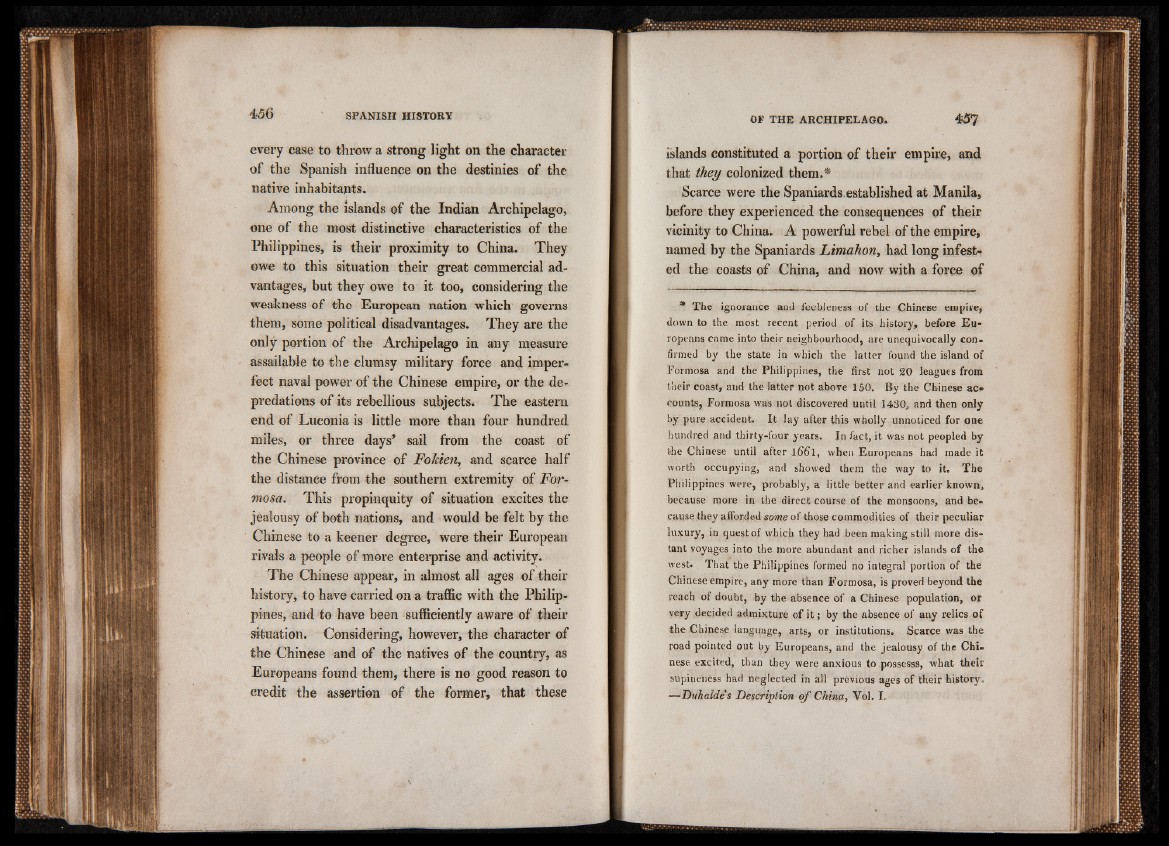
every case to throw a strong light on the character
of the Spanish influence on the destinies of the
native inhabitants.
Among the islands of the Indian Archipelago,
one of the most distinctive characteristics of the
Philippines, is their proximity to China. They
owe to this situation their great commercial advantages,
but they owe to it too, considering the
weakness of the European nation which governs
them, some political disadvantages. They are the
only portion of the Archipelago in any measure
assailable to the clumsy military force and imperfect
naval power of the Chinese empire, or the depredations
of its rebellious subjects. The eastern
end of Luconia is little more than four hundred
miles, or three days’ sail from the coast of
the Chinese province of Folcien, and scarce half
the distance from the southern extremity of Formosa.
This propinquity of situation excites the
jealousy of both nations, and would be felt by the
Chinese to a keener degree, were their European
rivals a people of more enterprise and activity.
The Chinese appear, in almost all ages of their
history, to have carried on a traffic with the Philippines,
and to have been sufficiently aware of their
situation. Considering, however, the character of
the Chinese and of the natives of the country, as
Europeans found them, there is no good reason to
credit the assertion of the former, that these
islands constituted a portion of their empire, and
that they colonized them.*
Scarce were the Spaniards, established at Manila,
before they experienced the consequences of their
vicinity to China. A powerful rebel of the empire,
named by the Spaniards Limahon, had long infested
the coasts of China, and now with a force of
* The ignorance and feebleness of the Chinese empire,
down to the most recent period of its history, before E uropeans
came into their neighbourhood, are unequivocally confirmed
by the state in which the latter found the island of
Formosa and the Philippines, the first not 20 leagues from
their coast, and the latter not above ISO. By the Chinese accounts,
Formosa was not discovered until 1430, and then only
by pure accident. It lay after this wholly unnoticed for one
hundréd and thirty-tour years. In fact, it was not peopled by
the Chinese until after l6 6 l, when Europeans had made it
worth occupying, and showed them the way to it. The
Philippines were, probably, a little better and earlier known,
because more in the direct course of the monsoons, and because
they afforded some of those commodities of their peculiar
luxury, in quest of which they had been making still more distant
voyages into the more abundant and richer islands of the
west. That the Philippines formed no integral portion of the
Chinese empire, any more than Formosa, is proved beyond the
reach of doubt, by the absence of a Chinese population, or
very decided admixture of it ; by the absence of any relics of
the Chinese language, arts, or institutions. Scarce was the
road pointed out by Europeans, and the jealousy of the Chinese
excited, than they were anxious to possesss, what their
supineness had neglected in all previous ages of their history.
—Duhaldes Description of China, Vol. I.